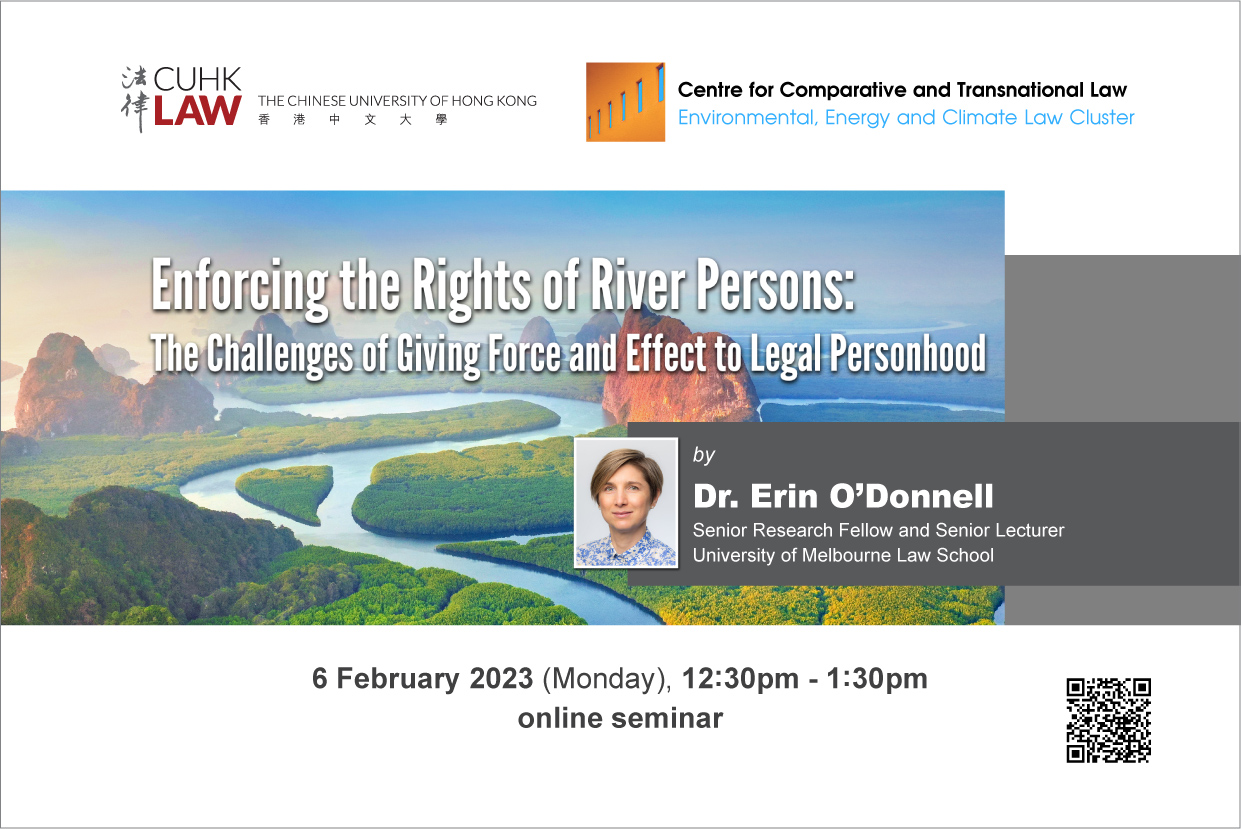活動
CUHK LAW CCTL Environmental, Energy and Climate Law Cluster Seminar – ‘Enforcing the Rights of River Persons: The Challenges of Giving Force and Effect to Legal Personhood’ by Dr. Erin O’Donnell (Online)
2023年2月6日
12:30 pm – 1:30 pm
Online via Zoom
Dr. Erin O’Donnell
Dr. Erin O’Donnell is a Senior Research Fellow and Senior Lecturer at the University of Melbourne Law School. Erin is a water law and policy expert, and she is recognized internationally for her research into the ground-breaking new field of legal rights for rivers. Her work explores the challenges and opportunities these new rights create for protecting the multiple social, cultural and natural values of rivers. Her work is informed by comparative analysis across Australia, Aotearoa New Zealand, the USA, Bangladesh, India, Colombia, and Chile. She has also worked for the World Bank, examining water markets and their role in water security and sustainable development. Since 2018, Erin has been a member of the Birrarung Council, the voice of the Yarra River in Melbourne. Erin works in partnership with Traditional Owners across Australia on a range of projects and in 2023, Erin will commence an ARC-funded research fellowship to explore the opportunity of treaty to address aqua nullius, increase Traditional Owner power and resources in water, and create more sustainable and legitimate settler state water laws.
cctl.law@cuhk.edu.hk
Once considered a ‘fringe’ environmental idea, the rights of nature is now fast becoming mainstream, as countries including Ecuador, Bolivia, Colombia, Panama, Mexico, the USA, Canada, Spain, Uganda, India, Bangladesh, Aotearoa New Zealand and Australia recognise nature as a legal subject or living entity in law. In some jurisdictions, these rights apply to nature as a whole, but there is a growing movement centred on the rights of rivers as unique and identifiable natural entities. However, as the legal status of rivers changes, the question now becomes: what happens next? Although most litigation on the rights of nature has focused on whether the rights exist, there is growing case law on what the rights include and how they can be enforced, especially in jurisdictions such as Ecuador, where nature has had rights since 2008. In the case of rivers, this is further complicated by the intersection (or lack thereof) between the new legal rights and the existing water laws. Although many rivers are now recognised as legal persons and/or living entities, none of them has any legal rights to the water flowing between their banks, nor do any (as yet) play substantive roles in water management. The novelty of the ‘river persons’ has left courts unclear on how the substantive nature of these rights can be enforced, and the legislature has been content to create such rights in enduring and explicit isolation from water laws. For the ‘rights of rivers’ movement to achieve its transformative potential, attention must now be given to the challenge of ensuring these new rights can have force and effect.
Language: English


